|
THE LAND OF THE LIVING AND THE
LAND OF THE DEAD
The History of Man is the record of a hungry creature in search
of food.
Wherever food was plentiful and easily gathered, thither man
travelled to make his home.
The fame of the Nile valley must have spread at an early date.
From far and wide, wild people flocked to the banks of the river.
Surrounded on all sides by desert or sea, it was not easy to reach
these fertile fields and only the hardiest men and women survived.
We do not know who they were. Some came from the interior of
Africa and had woolly hair and thick lips.
Others, with a yellowish skin, came from the desert of Arabia and
the broad rivers of western Asia.
They fought each other for the possession of this wonderful land.
They built villages which their neighbors destroyed and they
rebuilt them with the bricks they had taken from other neighbors
whom they in turn had vanquished.
Gradually a new race developed. They called themselves "remi,"
which means simply "the Men." There was a touch of pride in this
name and they used it in the same sense that we refer to America as
"God's own country."
Part of the year, during the annual flood of the Nile, they lived
on small islands within a country which itself was cut off from the
rest of the world by the sea and the desert. No wonder that these
people were what we call "insular," and had the habits of villagers
who rarely come in contact with their neighbors.
They liked their own ways best. They thought their own habits and
customs just a trifle better than those of anybody else. In the same
way, their own gods were considered more powerful than the gods of
other nations. They did not exactly despise foreigners, but they
felt a mild pity for them and if possible they kept them outside of
the Egyptian domains, lest their own people be corrupted by "foreign
notions."
They were kind-hearted and rarely did anything that was cruel.
They were patient and in business dealings they were rather
indifferent Life came as an easy gift and they never became stingy
and mean like northern people who have to struggle for mere
existence.
When the sun arose above the blood-red horizon of the distant
desert, they went forth to till their fields. When the last rays of
light had disappeared beyond the mountain ridges, they went to bed.
They worked hard, they plodded and they bore whatever happened
with stolid unconcern and profound patience.
They believed that this life was but a short preface to a new
existence which began the moment Death had entered the house. Until
at last, the life of the future came to be regarded as more
important than the life of the present and the people of Egypt
turned their teeming land into one vast shrine for the worship of
the dead.
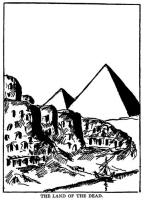
And as most of the papyrus-rolls of the ancient valley tell
stories of a religious nature we know with great accuracy just what
gods the Egyptians revered and how they tried to assure all possible
happiness and comfort to those who had entered upon the eternal
sleep. In the beginning each little village had possessed a god of
its own.
Often this god was supposed to reside in a queerly shaped stone
or in the branch of a particularly large tree. It was well to be
good friends with him for he could do great harm and destroy the
harvest and prolong the period of drought until the people and the
cattle had all died of thirst. Therefore the villages made him
presents--offered him things to eat or a bunch of flowers.
When the Egyptians went forth to fight their enemies the god must
needs be taken along, until he became a sort of battle flag around
which the people rallied in time of danger.
But when the country grew older and better roads had been built
and the Egyptians had begun to travel, the old "fetishes," as such
chunks of stone and wood were called, lost their importance and were
thrown away or were left in a neglected corner or were used as
doorsteps or chairs.
Their place was taken by new gods who were more powerful than the
old ones had been and who represented those forces of nature which
influenced the lives of the Egyptians of the entire valley.
First among these was the Sun which makes all things grow.
Next came the river Nile which tempered the heat of the day and
brought rich deposits of clay to refresh the fields and make them
fertile.
Then there was the kindly Moon which at night rowed her little
boat across the arch of heaven and there was Thunder and there was
Lightning and there were any number of things which could make life
happy or miserable according to their pleasure and desire.
Ancient man, entirely at the mercy of these forces of nature,
could not get rid of them as easily as we do when we plant lightning
rods upon our houses or build reservoirs which keep us alive during
the summer months when there is no rain.
On the contrary they formed an intimate part of his daily
life--they accompanied him from the moment he was put into his
cradle until the day that his body was prepared for eternal rest.
Neither could he imagine that such vast and powerful phenomena as
a bolt of lightning or the flood of a river were mere impersonal
things. Some one--somewhere--must be their master and must direct
them as the engineer directs his engine or a captain steers his
ship.
A God-in-Chief was therefore created, like the commanding general
of an army.
A number of lower officers were placed at his disposal.
Within their own territory each one could act independently.
In grave matters, however, which affected the happiness of all
the people, they must take orders from their master.
The Supreme Divine Ruler of the land of Egypt was called Osiris,
and all the little Egyptian children knew the story of his wonderful
life.
Once upon a time, in the valley of the Nile, there lived a king
called Osiris.
He was a good man who taught his subjects how to till their
fields and who gave his country just laws. But he had a bad brother
whose name was Seth.
Now Seth envied Osiris because he was so virtuous and one day he
invited him to dinner and afterwards he said that he would like to
show him something. Curious Osiris asked what it was and Seth said
that it was a funnily shaped coffin which fitted one like a suit of
clothes. Osiris said that he would like to try it. So he lay down in
the coffin but no sooner was he inside when bang!--Seth shut the
lid. Then he called for his servants and ordered them to throw the
coffin into the Nile.
Soon the news of his terrible deed spread throughout the land.
Isis, the wife of Osiris, who had loved her husband very dearly,
went at once to the banks of the Nile, and after a short while the
waves threw the coffin upon the shore. Then she went forth to tell
her son Horus, who ruled in another land, but no sooner had she left
than Seth, the wicked brother, broke into the palace and cut the
body of Osiris into fourteen pieces.
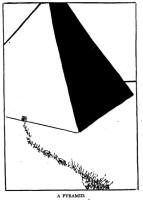
When Isis returned, she discovered what Seth had done. She took
the fourteen pieces of the dead body and sewed them together and
then Osiris came back to life and reigned for ever and ever as king
of the lower world to which the souls of men must travel after they
have left the body.
As for Seth, the Evil One, he tried to escape, but Horus, the son
of Osiris and Isis, who had been warned by his mother, caught him
and slew him.
This story of a faithful wife and a wicked brother and a dutiful
son who avenged his father and the final victory of virtue over
wickedness formed the basis of the religious life of the people of
Egypt.
Osiris was regarded as the god of all living things which
seemingly die in the winter and yet return to renewed existence the
next spring. As ruler of the Life Hereafter, he was the final judge
of the acts of men, and woe unto him who had been cruel and unjust
and had oppressed the weak.
As for the world of the departed souls, it was situated beyond
the high mountains of the west (which was also the home of the young
Nile) and when an Egyptian wanted to say that someone had died, he
said that he "had gone west."
Isis shared the honors and the duties of Osiris with him. Their
son Horus, who was worshipped as the god of the Sun (hence the word
"horizon," the place where the sun sets) became the first of a new
line of Egyptian kings and all the Pharaohs of Egypt had Horus as
their middle name.
Of course, each little city and every small village continued to
worship a few divinities of their own. But generally speaking, all
the people recognized the sublime power of Osiris and tried to gain
his favor.
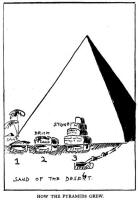
This was no easy task, and led to many strange customs. In the
first place, the Egyptians came to believe that no soul could enter
into the realm of Osiris without the possession of the body which
had been its place of residence in this world.
Whatever happened, the body must be preserved after death, and it
must be given a permanent and suitable home. Therefore as soon as a
man had died, his corpse was embalmed. This was a difficult and
complicated operation which was performed by an official who was
half doctor and half priest, with the help of an assistant whose
duty it was to make the incision through which the chest could be
filled with cedar-tree pitch and myrrh and cassia. This assistant
belonged to a special class of people who were counted among the
most despised of men. The Egyptians thought it a terrible thing to
commit acts of violence upon a human being, whether dead or living,
and only the lowest of the low could be hired to perform this
unpopular task.
Afterwards the priest took the body again and for a period of ten
weeks he allowed it to be soaked in a solution of natron which was
brought for this purpose from the distant desert of Libya. Then the
body had become a "mummy" because it was filled with "Mumiai" or
pitch. It was wrapped in yards and yards of specially prepared linen
and it was placed in a beautifully decorated wooden coffin, ready to
be removed to its final home in the western desert.
The grave itself was a little stone room in the sand of the
desert or a cave in a hill-side.
After the coffin had been placed in the center the little room
was well supplied with cooking utensils and weapons and statues (of
clay or wood) representing bakers and butchers who were expected to
wait upon their dead master in case he needed anything. Flutes and
fiddles were added to give the occupant of the grave a chance to
while away the long hours which he must spend in this "house of
eternity."
Then the roof was covered with sand and the dead Egyptian was
left to the peaceful rest of eternal sleep.
But the desert is full of wild creatures, hyenas and wolves, and
they dug their way through the wooden roof and the sand and ate up
the mummy.
This was a terrible thing, for then the soul was doomed to wander
forever and suffer agonies of a man without a home. To assure the
corpse all possible safety a low wall of brick was built around the
grave and the open space was filled with sand and gravel. In this
way a low artificial hill was made which protected the mummy against
wild animals and robbers.
Then one day, an Egyptian who had just buried his Mother, of whom
he had been particularly fond, decided to give her a monument that
should surpass anything that had ever been built in the valley of
the Nile.
He gathered his serfs and made them build an artificial mountain
that could be seen for miles around. The sides of this hill he
covered with a layer of bricks that the sand might not be blown
away.
People liked the novelty of the idea.
Soon they were trying to outdo each other and the graves rose
twenty and thirty and forty feet above the ground.
At last a rich nobleman ordered a burial chamber made of solid
stone.
On top of the actual grave where the mummy rested, he constructed
a pile of bricks which rose several hundred feet into the air. A
small passage-way gave entrance to the vault and when this passage
was closed with a heavy slab of granite the mummy was safe from all
intrusion.
The King of course could not allow one of his subjects to outdo
him in such a matter. He was the most powerful man of all Egypt who
lived in the biggest house and therefore he was entitled to the best
grave.
What others had done in brick he could do with the help of more
costly materials.
Pharaoh sent his officers far and wide to gather workmen. He
constructed roads. He built barracks in which the workmen could live
and sleep (you may see those barracks this very day). Then he set to
work and made himself a grave which was to endure for all time.
We call this great pile of masonry a "pyramid."
The origin of the word is a curious one.
When the Greeks visited Egypt the Pyramids were already several
thousand years old.
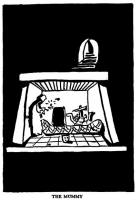
Of course the Egyptians took their guests into the desert to see
these wondrous sights just as we take foreigners to gaze at the
Wool-worth Tower and Brooklyn Bridge.
The Greek guest, lost in admiration, waved his hands and asked
what the strange mountains might be.
His guide thought that he referred to the extraordinary height
and said "Yes, they are very high indeed."
The Egyptian word for height was "pir-em-us."
The Greek must have thought that this was the name of the whole
structure and giving it a Greek ending he called it a "pyramis."
We have changed the "s" into a "d" but we still use the same
Egyptian word when we talk of the stone graves along the banks of
the Nile.
The biggest of these many pyramids, which was built fifty
centuries ago, was five hundred feet high.
At the base it was seven hundred and fifty-five feet wide.
It covered more than thirteen acres of desert, which is three
times as much space as that occupied by the church of Saint Peter,
the largest edifice of the Christian world.
During twenty years, over a hundred thousand men were used to
carry the stones from the distant peninsula of Sinai--to ferry them
across the Nile (how they ever managed to do this we do not
understand)--to drag them halfway across the desert and finally
hoist them into their correct position.
But so well did Pharaoh's architects and engineers perform their
task that the narrow passage-way which leads to the royal tomb in
the heart of the pyramid has never yet been pushed out of shape by
the terrific weight of those thousands and thousands of tons of
stone which press upon it from all sides.
THE
MAKING OF A STATE
Nowadays we all are members of a "state."
We may be Frenchmen or Chinamen or Russians; we may live in the
furthest corner of Indonesia (do you know where that is?), but in
some way or other we belong to that curious combination of people
which is called the "state."
It does not matter whether we recognize a king or an emperor or a
president as our ruler. We are born and we die as a small part of
this large Whole and no one can escape this fate.
The "state," as a matter of fact, is quite a recent invention.
The earliest inhabitants of the world did not know what it was.
Every family lived and hunted and worked and died for and by
itself. Sometimes it happened that a few of these families, for the
sake of greater protection against the wild animals and against
other wild people, formed a loose alliance which was called a tribe
or a clan. But as soon as the danger was past, these groups of
people acted again by and for themselves and if the weak could not
defend their own cave, they were left to the mercies of the hyena
and the tiger and nobody was very sorry if they were killed.
In short, each person was a nation unto himself and he felt no
responsibility for the happiness and safety of his neighbor. Very,
very slowly this was changed and Egypt was the first country where
the people were organized into a well-regulated empire.
The Nile was directly responsible for this useful development. I
have told you how in the summer of each year the greater part of the
Nile valley and the Nile delta is turned into a vast inland sea. To
derive the greatest benefit from this water and yet survive the
flood, it had been necessary at certain points to build dykes and
small islands which would offer shelter for man and beast during the
months of August and September. The construction of these little
artificial islands however had not been simple.
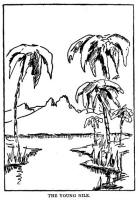
A single man or a single family or even a small tribe could not
construct a river-dam without the help of others.
However much a farmer might dislike his neighbors he disliked
getting drowned even more and he was obliged to call upon the entire
country-side when the water of the river began to rise and
threatened him and his wife and his children and his cattle with
destruction.
Necessity forced the people to forget their small differences and
soon the entire valley of the Nile was covered with little
combinations of people who constantly worked together for a common
purpose and who depended upon each other for life and prosperity.
Out of such small beginnings grew the first powerful State.
It was a great step forward along the road of progress.
It made the land of Egypt a truly inhabitable place. It meant the
end of lawless murder. It assured the people greater safety than
ever before and gave the weaker members of the tribe a chance to
survive. Nowadays, when conditions of absolute disorder exist only
in the jungles of Africa, it is hard to imagine a world without laws
and policemen and judges and health officers and hospitals and
schools.
But five thousand years ago, Egypt stood alone as an organized
state and was greatly envied by those of her neighbors who were
obliged to face the difficulties of life single-handedly.
A state, however, is not only composed of citizens.
There must be a few men who execute the laws and who, in case of
an emergency, take command of the entire community. Therefore no
country has ever been able to endure without a single head, be he
called a King or an Emperor or a Shah (as in Persia) or a President,
as he is called in our own land.
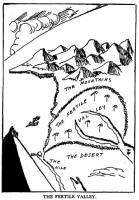
In ancient Egypt, every village recognized the authority of the
Village-Elders, who were old men and possessed greater experience
than the young ones. These Elders selected a strong man to command
their soldiers in case of war and to tell them what to do when there
was a flood. They gave him a title which distinguished him from the
others. They called him a King or a prince and obeyed his orders for
their own common benefit.
Therefore in the oldest days of Egyptian history, we find the
following division among the people:
The majority are peasants.
All of them are equally rich and equally poor.
They are ruled by a powerful man who is the commander-in-chief of
their armies and who appoints their judges and causes roads to be
built for the common benefit and comfort.
He also is the chief of the police force and catches the thieves.
In return for these valuable services he receives a certain
amount of everybody's money which is called a tax. The greater part
of these taxes, however, do not belong to the King personally. They
are money entrusted to him to be used for the common good.
But after a short while a new class of people, neither peasants
nor king, begins to develop. This new class, commonly called the
nobles, stands between the ruler and his subjects.
Since those early days it has made its appearance in the history
of every country and it has played a great role in the development
of every nation.
I must try and explain to you how this class of nobles developed
out of the most commonplace circumstances of everyday life and why
it has maintained itself to this very day, against every form of
opposition.
To make my story quite clear, I have drawn a picture.
It shows you five Egyptian farms. The original owners of these
farms had moved into Egypt years and years ago. Each had taken a
piece of unoccupied land and had settled down upon it to raise grain
and cows and pigs and do whatever was necessary to keep themselves
and their children alive. Apparently they had the same chance in
life.
How then did it happen that one became the ruler of his neighbors
and got hold of all their fields and barns without breaking a single
law?
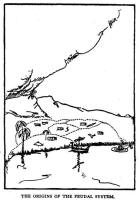
One day after the harvest, Mr. Fish (you see his name in
hieroglyphics on the map) sent his boat loaded with grain to the
town of Memphis to sell the cargo to the inhabitants of central
Egypt. It happened to have been a good year for the farmer and Fish
got a great deal of money for his wheat. After ten days the boat
returned to the homestead and the captain handed the money which he
had received to his employer.
A few weeks later, Mr. Sparrow, whose farm was next to that of
Fish, sent his wheat to the nearest market. Poor Sparrow had not
been very lucky for the last few years. But he hoped to make up for
his recent losses by a profitable sale of his grain. Therefore he
had waited until the price of wheat in Memphis should have gone a
little higher.
That morning a rumor had reached the village of a famine in the
island of Crete. As a result the grain in the Egyptian markets had
greatly increased in value.
Sparrow hoped to profit through this unexpected turn of the
market and he bade his skipper to hurry.
The skipper handled the rudder of his craft so clumsily that the
boat struck a rock and sank, drowning the mate who was caught under
the sail.
Sparrow not only lost all his grain and his ship but he was also
forced to pay the widow of his drowned mate ten pieces of gold to
make up for the loss of her husband.
These disasters occurred at the very moment when Sparrow could
not afford another loss.
Winter was near and he had no money to buy cloaks for his
children. He had put off buying new hoes and spades for such a long
time that the old ones were completely worn out. He had no seeds for
his fields. He was in a desperate plight.
He did not like his neighbor, Mr. Fish, any too well but there
was no way out. He must go and humbly he must ask for the loan of a
small sum of money.
He called on Fish. The latter said that he would gladly let him
have whatever he needed but could Sparrow put up any sort of
guaranty?
Sparrow said, "Yes." He would offer his own farm as a pledge of
good faith.
Unfortunately Fish knew all about that farm. It had belonged to
the Sparrow family for many generations. But the Father of the
present owner had allowed himself to be terribly cheated by a
Phoenician trader who had sold him a couple of "Phrygian Oxen"
(nobody knew what the name meant) which were said to be of a very
fine breed, which needed little food and performed twice as much
labor as the common Egyptian oxen. The old farmer had believed the
solemn words of the impostor. He had bought the wonderful beasts,
greatly envied by all his neighbors.
They had not proved a success.
They were very stupid and very slow and exceedingly lazy and
within three weeks they had died from a mysterious disease.
The old farmer was so angry that he suffered a stroke and the
management of his estate was left to the son, who worked hard but
without much result.
The loss of his grain and his vessel were the last straw.
Young Sparrow must either starve or ask his neighbor to help him
with a loan.
Fish who was familiar with the lives of all his neighbors (he was
that kind of person, not because he loved gossip but one never knew
how such information might come in handy) and who knew to a penny
the state of affairs in the Sparrow household, felt strong enough to
insist upon certain terms. Sparrow could have all the money he
needed upon the following condition. He must promise to work for
Fish six weeks of every year and he must allow him free access to
his grounds at all times.
Sparrow did not like these terms, but the days were growing
shorter and winter was coming on fast and his family were without
food.
He was forced to accept and from that time on, he and his sons
and daughters were no longer quite as free as they had been before.
They did not exactly become the servants or the slaves of their
neighbor, but they were dependent upon his kindness for their own
livelihood. When they met Fish in the road they stepped aside and
said "Good morning, sir." And he answered them--or not--as the case
might be.
He now owned a great deal of water-front, twice as much as
before.
He had more land and more laborers and he could raise more grain
than in the past years. The nearby villagers talked of the new house
he was building and in a general way, he was regarded as a man of
growing wealth and importance.
Late that summer an unheard-of-thing happened.
It rained.
The oldest inhabitants could not remember such a thing, but it
rained hard and steadily for two whole days. A little brook, the
existence of which everybody had forgotten, was suddenly turned into
a wild torrent. In the middle of the night it came thundering down
from the mountains and destroyed the harvest of the farmer who
occupied the rocky ground at the foot of the hills. His name was Cup
and he too had inherited his land from a hundred other Cups who had
gone before. The damage was almost irreparable. Cup needed new seed
grain and he needed it at once. He had heard Sparrow's story. He too
hated to ask a favor of Fish who was known far and wide as a shrewd
dealer. But in the end, he found his way to the Fishs' homestead and
humbly begged for the loan of a few bushels of wheat. He got them
but not until he had agreed to work two whole months of each year on
the farm of Fish.
Fish was now doing very well. His new house was ready and he
thought the time had come to establish himself as the head of a
household.
Just across the way, there lived a farmer who had a young
daughter. The name of this farmer was Knife. He was a happy-go-lucky
person and he could not give his child a large dowry.
Fish called on Knife and told him that he did not care for money.
He was rich and he was willing to take the daughter without a single
penny. Knife, however, must promise to leave his land to his
son-in-law in case he died.
This was done.
The will was duly drawn up before a notary, the wedding took
place and Fish now possessed (or was about to possess) the greater
part of four farms.
It is true there was a fifth farm situated right in between the
others. But its owner, by the name of Sickle, could not carry his
wheat to the market without crossing the lands over which Fish held
sway. Besides, Sickle was not very energetic and he willingly hired
himself out to Fish on condition that he and his old wife be given a
room and food and clothes for the rest of their days. They had no
children and this settlement assured them a peaceful old age. When
Sickle died, a distant nephew appeared who claimed a right to his
uncle's farm. Fish had the dogs turned loose on him and the fellow
was never seen again.
These transactions had covered a period of twenty years.
The younger generations of the Cup and
Sickle and Sparrow families accepted their situation in life
without questioning. They knew old Fish as "the Squire" upon whose
good-will they were more or less dependent if they wanted to succeed
in life.
When the old man died he left his son many wide acres and a
position of great influence among his immediate neighbors.
Young Fish resembled his father. He was very able and had a great
deal of ambition. When the king of Upper Egypt went to war against
the wild Berber tribes, he volunteered his services.
He fought so bravely that the king appointed him Collector of the
Royal Revenue for three hundred villages.
Often it happened that certain farmers could not pay their tax.
Then young Fish offered to give them a small loan.
Before they knew it, they were working for the Royal Tax
Gatherer, to repay both the money which they had borrowed and the
interest on the loan.
The years went by and the Fish family reigned supreme in the land
of their birth. The old home was no longer good enough for such
important people.
A noble hall was built (after the pattern of the Royal Banqueting
Hall of Thebes). A high wall was erected to keep the crowd at a
respectful distance and Fish never went out without a bodyguard of
armed soldiers.
Twice a year he travelled to Thebes to be with his King, who
lived in the largest palace of all Egypt and who was therefore known
as "Pharaoh," the owner of the "Big House."
Upon one of his visits, he took Fish the Third, grandson of the
founder of the family, who was a handsome young fellow.
The daughter of Pharaoh saw the youth and desired him for her
husband. The wedding cost Fish most of his fortune, but he was still
Collector of the Royal Revenue and by treating the people without
mercy he was able to fill his strong-box in less than three years.
When he died he was buried in a small Pyramid, just as if he had
been a member of the Royal Family, and a daughter of Pharaoh wept
over his grave.
That is my story which begins somewhere along the banks of the
Nile and which in the course of three generations lifts a farmer
from the ranks of his own humble ancestors and drops him outside the
gate but near the throne-room of the King's palace.
What happened to Fish, happened to a large number of equally
energetic and resourceful men.
They formed a class apart.
They married each other's daughters and in this way they kept the
family fortunes in the hands of a small number of people.
They served the King faithfully as officers in his army and as
collectors of his taxes.
They looked after the safety of the roads and the waterways.
They performed many useful tasks and among themselves they obeyed
the laws of a very strict code of honor.
If the Kings were bad, the nobles were apt to be bad too.
When the Kings were weak the nobles often managed to get hold of
the State.
Then it often happened that the people arose in their wrath and
destroyed those who oppressed them.
Many of the old nobles were killed and a new division of the land
took place which gave everybody an equal chance.
But after a short while the old story repeated itself.
This time it was perhaps a member of the Sparrow family who used
his greater shrewdness and industry to make himself master of the
countryside while the descendants of Fish (of glorious memory!) were
reduced to poverty.
Otherwise very little was changed.
The faithful peasants continued to work and pay taxes.
The equally faithful tax gatherers continued to gather wealth.
But the old Nile, indifferent to the ambitions of men, flowed as
placidly as ever between its age-worn banks and bestowed its fertile
blessings upon the poor and upon the rich with the impartial justice
which is found only in the forces of nature. |
